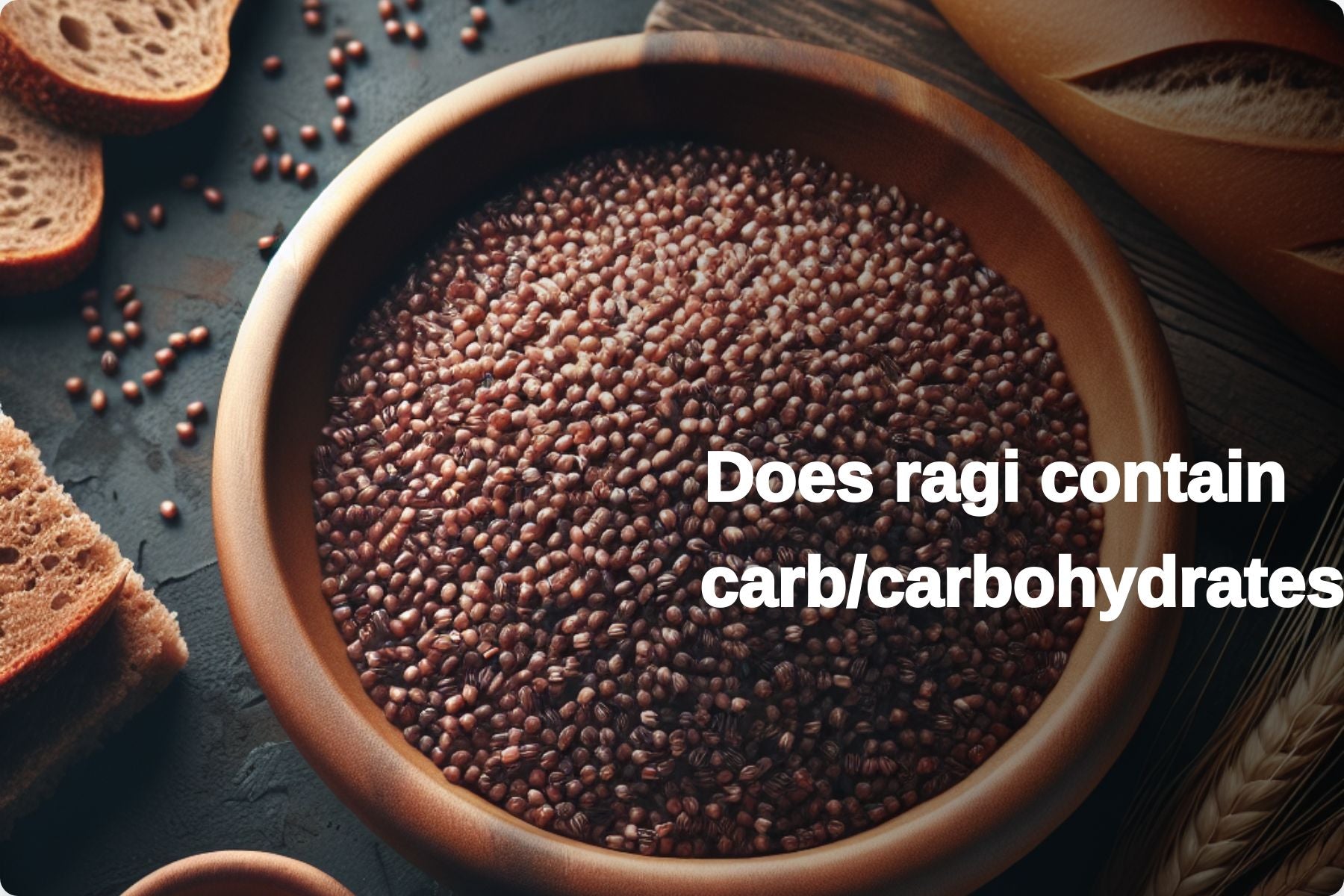
Does ragi contain carbs/carbohydrates?
Ragi, also called finger millet, is becoming really popular as a super healthy grain. It's not just a basic food – it's packed with important nutrients. Originally from Africa, people all around the world are using it in their cooking because it can grow in different climates and soil types.
In many Asian and African recipes, ragi is the star ingredient. People use it to make flatbreads and porridges, and its versatility makes it a favorite in many kitchens. But it's not just about taste – ragi is also getting attention for being a super healthy choice. It's full of good stuff like calcium, iron, and fiber, making it a great alternative to refined grains.
Nowadays, more and more people are realizing the health benefits of ragi, and it's finding a place in modern diets. People want food that's rich in nutrients, and ragi fits the bill by providing essential vitamins and minerals. This introduction sets the stage for taking a closer look at what's in ragi, especially its carbohydrates, and how it can be part of a balanced diet.
Nutritional Composition of Ragi
To really know how good ragi is for you, let's take a closer look at what it's made of. Ragi has a bunch of good stuff that our bodies need. One important thing to check out is how many carbohydrates it has.
Carbs are like fuel for our bodies, and ragi gives us a good amount without the problems that come with sugary stuff. The carbs in ragi are the kind that release energy slowly, avoiding the sudden ups and downs that happen with simple sugars. If you're watching your carb intake, it's important to know what kind of carbs ragi has.
But ragi isn't just about carbs; it's full of other good things too. It's got a lot of dietary fiber, which helps with digestion and makes you feel full. This makes ragi a smart choice for people looking to manage their weight or control their blood sugar.
When it comes to picking the right foods, it's important to understand what's in them. Ragi, with all its good stuff, is a great option for those who want not just energy but also a bunch of important nutrients. In the next part, we'll take a closer look at the carbs in ragi, breaking down the details to help us make healthier food choices.
Nutritional Value Chart of Ragi per 100g:
| Nutritional Component | Value |
| Energy | 320Kcal |
| Protein | 7g |
| Carbohydrates | 67g |
| Dietary fibre | 11g |
| Calcium | 364mg |
| Iron | 4.62mg |
Carbohydrate Content in Ragi
Does Ragi have carbs? Absolutely. Knowing how much carbohydrate is in ragi is important for those keeping an eye on what they eat. So, you might be wondering, how many carbs does ragi have in 100 grams?
Well, in 100 grams of ragi, you'll find about 73-75 grams of carbohydrates. But, it's not the same as the carbs in processed foods. Ragi has complex carbohydrates, which means they take more time to break down, giving you a steady supply of energy. This makes ragi a good option for keeping your energy levels stable throughout the day, without the ups and downs linked to simple sugars.
Let's clear up a common misunderstanding – some people think all carbs are bad. Actually, our bodies need carbs to work well. The key is choosing the right kind of carbs, and ragi fits that bill perfectly.
For those who care about their carb intake, ragi is a wholesome choice. It's not just about carbs – ragi is full of nutrients, making it a valuable part of a balanced diet. As we go forward, we'll compare ragi's carb content with other grains, showing why it's a great, nutrient-rich option.
Comparative Analysis with Other Grains
Let's see how ragi compares to other popular grains, especially when it comes to carbohydrates. Ragi has a similar amount of carbs per 100g as rice and wheat, but the big difference is the kind of carbs it has. Ragi is full of complex carbs, which give you a steady energy release, unlike the quick bursts you get from refined grains. This makes it a great pick for people looking to control their blood sugar levels and have steady energy all day.
Ragi is also impressive for its micronutrients, like calcium and iron, which are often not as much in other grains. If you have dietary restrictions or want a nutrient-packed alternative, ragi is a good choice.
The high fiber in ragi is another plus. Compared to refined grains, it helps with digestion and makes you feel full, which can help with managing weight.
While rice and wheat are good in their own ways, ragi's unique nutrients make it a top choice for overall health. To sum it up, ragi can be a great addition to different diets, offering something special for everyone.
Ragi: more than just a grain
Summing up our look at ragi and its nutrition, it's clear this simple grain is a good choice for a healthy diet. With its mix of nutrients and reasonable amount of carbs, ragi is a smart addition to different eating plans.
We found out that ragi has about 73-75 grams of carbs per 100 grams, providing steady energy. This makes it a good pick for those wanting to stay away from the problems linked to refined carbs. The complex carbs in ragi help keep blood sugar levels steady, giving you lasting energy all day.
Comparing ragi to other grains, it's clear that, even though the carb content is similar, ragi stands out. It's packed with important minerals like calcium and iron, and has a lot of fiber. This makes it an excellent choice for people with specific dietary needs.
For those keeping an eye on carb intake, ragi is a good choice. It's full of nutrients, and the mix of complex carbs and fiber suits individuals aiming for balanced and lasting energy.
To wrap it up, ragi is more than just a grain; it's a nutritional friend with many health benefits. Whether you want to manage your weight, control blood sugar, or simply boost your overall well-being, ragi is a valuable addition to your diet. Like with any food, it's important to eat it in moderation, but including ragi can positively contribute to a healthy and balanced lifestyle.
This Blog post is an initiative by Lo Foods, to provide accurate and Nutritionist / Doctor approved information related to Health. Lo Foods is India's leading brand for Everyday Functional Foods. Foods designed for specific Health conditions or Needs. Lo Foods also runs India's largest range of Low Carb Healthy Cloud Kitchens, under the brand names of Lo!, ProteinChef, ATH (All Things Healthy) and DiabeSmart.

















Leave a comment
Your email address will not be published.